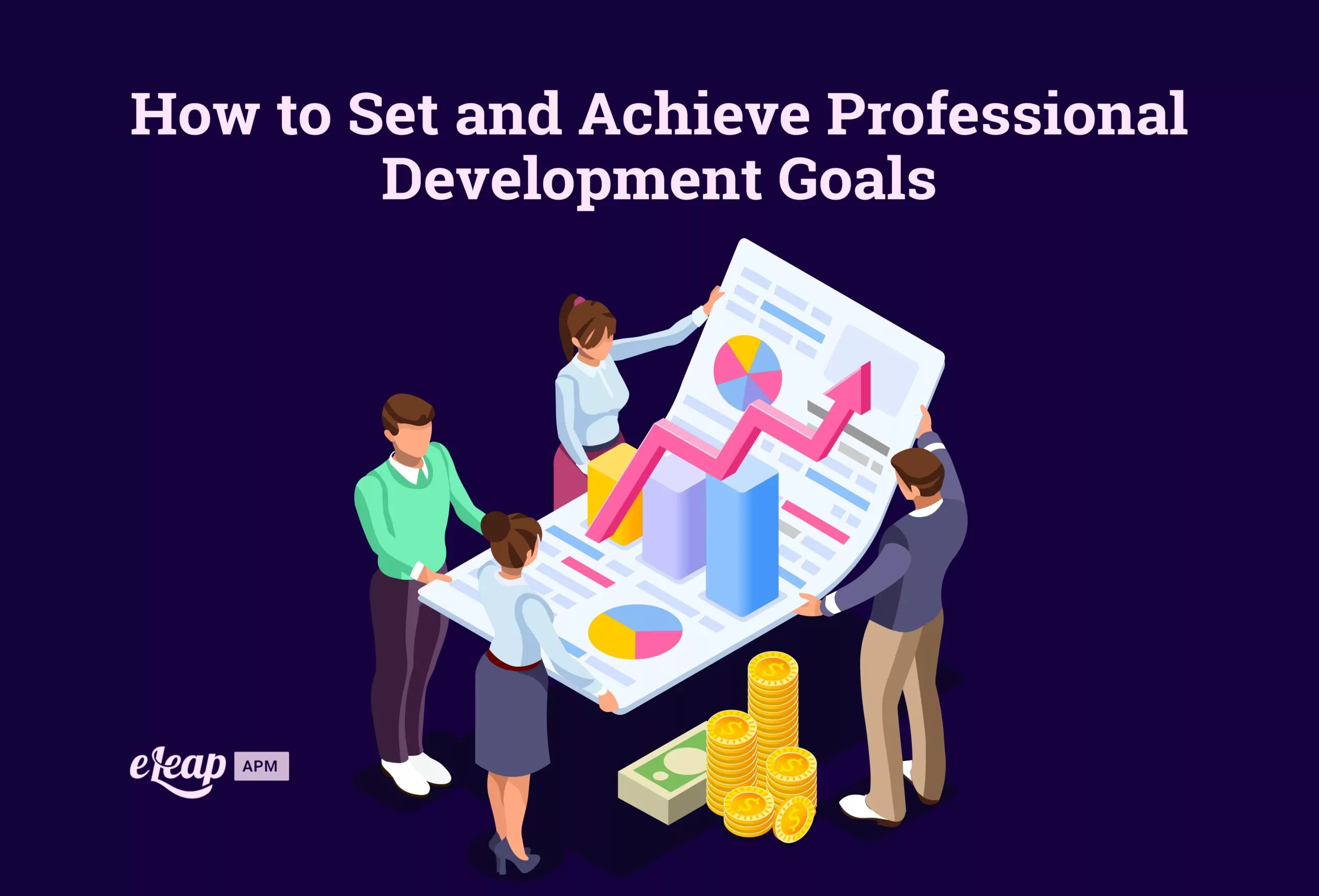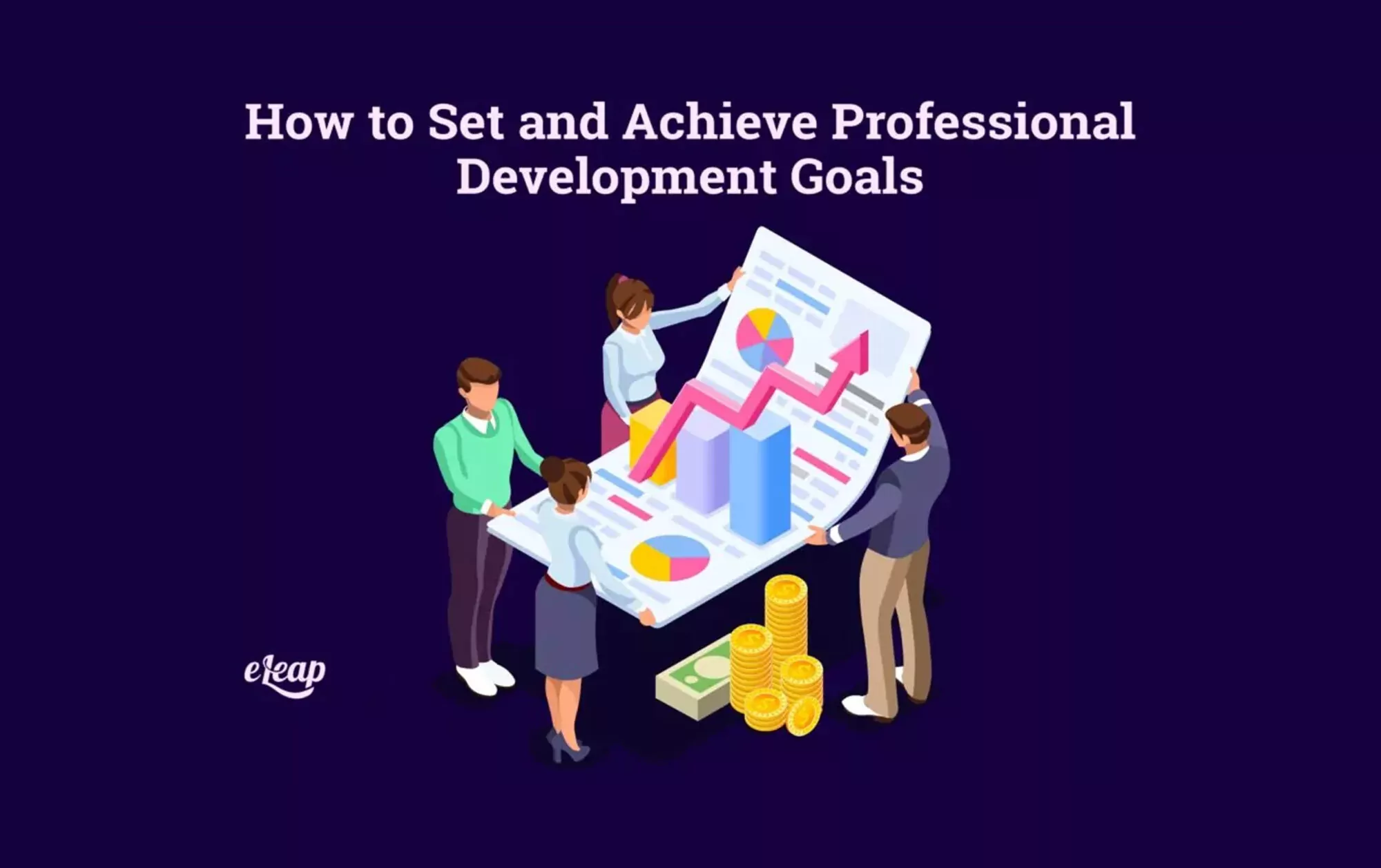How to Set and Achieve Professional Development Goals

No matter what your career is or what industry you work in, setting professional development goals is a necessary part of growth and success. Everyone’s goals are different, so there isn’t a surefire way to progress in your career. However, it doesn’t matter what your individual goals are; it helps to know how to set and achieve them. To manage goals in your organization, start a 30-day free trial of the eLeaP People Success Platform and see how this process can be streamlined and effective.
Remember, every goal, no matter how small, that you work toward in your professional development is an investment in yourself. Whether it’s improving your career, your mindset, or your performance, a career growth goal can be anything that motivates you to improve and reach the ultimate level of job satisfaction.
Following a professional development plan allows you to stay accountable for the things you want to accomplish. Here, we will go over some tips for setting and achieving your professional development goals.

Get Organized
Before you do anything, you need to get organized. It’s important that you know how you’re going to move forward and proceed with your goals and what you need to do to get there. Organization can also involve physically organizing your workspace, so you have a clear work area and a clear mind. Organizing your workspace can mean decluttering it so you can be more productive by eliminating distractions. Organizing can help you feel more ready to tackle your goals moving forward.
Using time-tracking tools can also help you determine where you spend most of your time in order to organize your work better. It can also help you to figure out what tasks take up the most of your day and then tackle those first so they aren’t looming over you while you try to finish up other projects.
Organizing can also involve creating a list of the things you need to do to achieve your goals. This is particularly helpful if you’re trying to achieve a big goal that you need to break down into smaller steps to make it seems less daunting.
Build Your Professional Network
No matter how much you love or hate networking, it’s essential for good career growth. When you establish and maintain relationships with fellow industry professionals, you will have a group of individuals with whom you can discuss ideas and get support.
Establishing a solid network may also allow you to access advice or opportunities that wouldn’t otherwise be available to you. If you don’t work in a career where you’re naturally open to networking opportunities or meeting people in person, consider joining a networking site like LinkedIn. If you do work in an in-person work environment, establish a network in your company, even with those in different departments. You should also look for local meetups or attend conferences. Overall, it’s important to constantly work on building your network in order to achieve professional growth.
Read More
Professional development goals often include reading more, and for good reason. Reading is one of the best ways to learn. A huge majority of very successful people read for at least 30 minutes a day. It helps your knowledge, vocabulary, creativity, and numerous other skills that can benefit you in your professional development. Here are some steps you can take to start reading more for your professional growth:
- Make a list of the books you want to read and then put them in order of priority.
- Set time aside each day, at least 30 minutes, to read. Don’t allow yourself to forgo your reading time. Treat it as an important part of your job.
- Choose a realistic timeframe to read and finish the books on your list.
Achieve the Ideal Work-Life Balance
Achieving work-life balance might not seem like a top tip for professional development, but it’s actually crucially important. The result is a more productive and happy life, and it has an exceptionally positive impact on your career and well-being. Achieving a work-life balance will ultimately make you more able to work hard and be productive when you are at work. It’s admirable to have a great work ethic, but you also need to avoid burnout by taking care of yourself.
When you’re at home or have time off work, avoid checking your phone and answering work calls, or looking at your emails. It can be difficult to ignore work when you’re attempting to strive towards a goal, but it’s very important for your mental health. One of the key factors to achieving a good work-life balance is being able to unplug entirely from work and enjoy time to yourself.
Use Your Performance Evaluations to Your Advantage
Performance evaluations can feel stressful, and, in many cases, they leave you feeling a bit disheartened or unsure of how to progress. But look at your performance evaluations in a positive light and try to use them to your advantage.
Consider performance evaluations as an opportunity to obtain an objective opinion of your progress toward your goals. Make sure to ask for feedback during your performance reviews to make sure you have something you can work on. Even if you’re exceeding expectations, there’s always something that can be improved and help you along your career path. Use performance evaluations as an ideal opportunity to choose what goals you set and work towards climbing the career ladder.
No matter where you are in your career, there’s always more you can learn and accomplish. Complacency in your career path will only leave you eventually feeling dissatisfied with your job. Career growth and development are hugely linked to job satisfaction; we all like to feel like we’re working towards something and improving ourselves. Setting professional development goals can seem daunting, but if you organize yourself and use feedback as a basis for setting goals, you can start to work towards them. Don’t feel daunted by larger goals; take things a step at a time, and you’ll soon find yourself happier and more productive in the workplace.